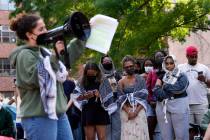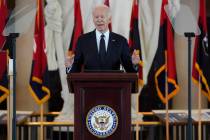Las Vegas authorities lag in forming federal partnership
Las Vegas Metropolitan Police Department officers don't look for immigration violations unless they are discovered during the investigation of another crime. "Our policy states that if they haven't committed a crime, we're not going to press the issue," says department spokesman Jose Montoya.
Bottom line: A long-standing department policy forbids local police from simply asking potential immigration violators about their legal status.
That contrasts with an increasing number of local police departments nationwide who are forging agreements with Immigration and Customs Enforcement that in effect deputize certain officers for immigration enforcement.
ICE touts the so-called 287(g) program as a key tool in identifying illegal immigrants who often come into contact with local authorities first.
To date, 65 departments, including those in Los Angeles and Phoenix, have formed ICE partnerships or are in the process of doing so.
Without one here, immigration officials try to fill gaps in a porous system of identifying illegal immigrants who pass through the local justice system.
The process has been scattershot, especially at local jails.
Frank Galvan, the head of ICE's local detention and removal operations, says jails in Clark County are inconsistent in record keeping, making it difficult to identify who is here illegally.
"We're working with jails to compile a foreign-born list," he says. "We're trying to be more proactive in establishing communication with different law enforcement groups here."
Capt. Jack Donahue at the Clark County Detention Center said local police have begun discussing whether to seek a local-federal agreement, a development that came about after the Review-Journal pressed the department on why it didn't have one.
"The sheriff is diligently looking into this," Donahue said. "We're gathering all available information about it."
As it stands, police don't keep track of the illegal immigrant population in the county jail. Jail officials stopped sending ICE a list of foreign-born inmates in 2005, said Las Vegas police Deputy Chief Leroy Kirkegard.
Only a fraction of local inmates in the country illegally are turned over to federal authorities each year. In most cases the inmates are identified through criminal background checks that show they are wanted by ICE.
Last year, ICE took 466 illegal immigrants from the detention center, less than 1 percent of the total jail population of more than 70,000.
If illegal immigrants are identified at all, it usually doesn't happen until they enter state prisons, where the Nevada Department of Corrections estimates more than 12 percent of inmates are foreign-born.
Lori Haley, an ICE spokeswoman, says her agency's work is less effective in places that don't have partnerships with local police. "Having trained officers in jails frees up ICE agents to do bigger investigations," Haley says. "That's not happening right now in Nevada."
Montoya says local police help federal immigration authorities to the extent possible: "Our officers pretty much are running call to call. Sometimes officers don't have time to do proactive police duties."
Review-Journal writer Frank Geary contributed to this report.
ILLEGAL IMMIGRATION: Counting The CostMore News Stories























